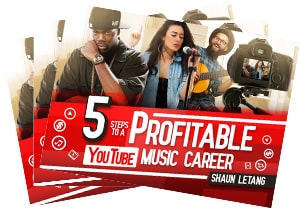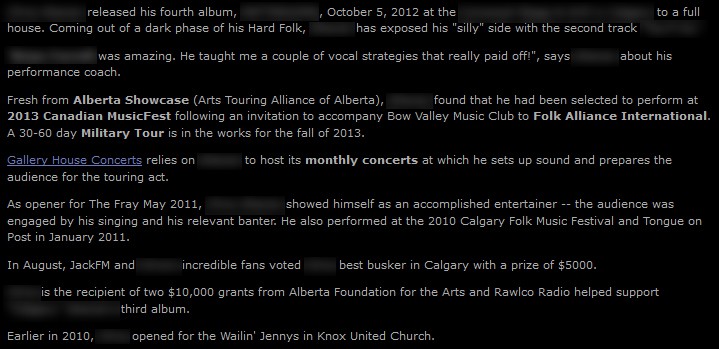

So, you’ve committed to writing your own bio.
In an ideal world, you would get a professional to help you with this. But hiring a writer can be pricey. And, if you’re just getting your start in music, you probably don’t have much money.
I understand. I’ve been in your shoes.
Early on in my music career, I once had my sister write my bio. Not necessarily because she was the best candidate to write it, but because I felt an outside perspective might be helpful. I also wanted to enlist the help of family, friends and fans to further my career.
Getting help is not a bad idea. But if you get your 14-year-old cousin who spends all his time in a basement staring at a computer to write your bio, you might end up regretting that decision because you will probably have to rewrite and edit it yourself when all is said and done.
It’s altogether too easy to end up with a crappy bio. So, my commitment to you is to help you understand what makes a good bio and what doesn’t. I want to set you up to win.
Are you ready? Read on.
But first, if it's your aim to do music professionally, you'll want to check out our free ebook while it's still available:

Free eBook: Discover how real independent musicians like you are making $4,077 - $22,573+ monthly via Youtube, let me know where to send the details:
Great. You were a finalist at such and such contest. You played at XYZ festival. You shared the stage with Gene Simmons. You got a bit of radio airplay from that station down the street.
If I was a publicist or media person looking to cover you in a blog or magazine feature, I would be horrified to find your bio read like a long list of credentials. Even as an event organizer, I would be at a loss as to how to promote you.
Why? Because I wouldn’t be able to tell a story.
Now, don’t get me wrong – I’m not saying your credentials shouldn’t be a part of your bio. They can lend credibility to your name and boost your profile. If you can get Jay-Z to write a great quote for you, go for it!
But don’t make your bio read like a resume. You can always create a section under your bio called “Career Highlights” or something like that and share your accomplishments in point form. First and foremost, your bio should tell a story. About you.
Recognize that your bio isn’t for you. It’s for your fans, event organizers, venue owners and media people. It’s a tough balancing act, but there is a way to satisfy everyone.
I have an example of an artist whose bio reads like a list of credentials. But I’m not going to link to his site. I’m also going to blur out his name to protect his anonymity. Still, it’s a good example of what not to do, so I’m going to show you. This is not a bio. It is a resume.


So, your bio is not a resume. What is it then?
It should be a compelling story.
Your bio should be full of interesting and compelling facts. If your band is made up entirely of brothers and cousins, mention that! If you were a carny for a few years before you discovered your love of music, mention that! If you went on a trip across the country on a train in search of yourself and ended up reuniting with your long-lost songwriting partner, mention that!
I’m not going to point to my bio as a shining example of what and what not to do, but people who’ve read it have generally been impressed. I’m not surprised by that, because I concentrated on just the highlights in my life – the critical events and turning points that shaped who I am, especially as a musician.
In my bio, I talk about:
So, when I say you should tell a story, I’m not saying you should tell your life story. Please focus on the most interesting bits and don’t be afraid to dramatize a bit.
Now, I’m going to show you an example of a bio that tells a great story – Christian rocker Lincoln Brewster’s bio.
To be honest, I hate how the bio begins:
For as long as he can remember, music has been an integral part of Lincoln Brewster’s life.
I’m sure that’s not unique to Lincoln. There are a lot of musicians that could say that! But then, at the end of the first paragraph, it gets into the meat of the story:
[Music] was a refuge for Lincoln and his mom in a home plagued by substance abuse and domestic violence.
Whoa. Now I’m drawn in.
His bio goes onto tell the story of how his mom went through a painful divorce, forcing his family to relocate in California. It also highlights his work with Journey singer Steve Perry.
Overall, Lincoln’s bio is simple, to the point, and engaging. It’s not overly long either. That’s what you want. If a media person was interested in covering you, this is what they’d be looking for.

So, you probably aren’t a household name yet.
And, that’s perfectly fine. But that means you could use a bit of a credibility boost.
Now, the same thing that applies to credentials also applies to quotes – you can easily insert too many into your bio, making it completely unreadable.
A big collection of quotes is about as bad as a big list of credentials. Why? Because, again, they don’t tell a story. And, even if they do, it won’t be a cohesive story.
But used sparingly, they can enhance your bio and bring it to life.
I love Helen Austin’s bio. It’s the perfect mix of story, credentials, and quotes.
It begins like this:
After years of writing songs while making a living as a musical stand-up comedian, Helen Austin’s move to Canada in 2002 was the catalyst for her music career.
Perfect. I’m drawn in immediately.
Then, the second paragraph establishes the kind of artist she is while also drawing attention to the things she’s accomplished:
15 years and six albums later, Helen is a prolific songwriter with over 70 TV, movie and ad placements, awards and competition wins under belt including a JUNO, a Canadian Folk Music Award and the top John Lennon Songwriting Contest Prize of Song of the Year.
Again, perfect. It doesn’t drone on and on about what she’s accomplished. It nicely summarizes the most important points of her career in just one paragraph.
Then, you’ll find a couple of quotes that add to the bio and Helen’s credibility. These quotes come from Indie Music Review Magazine and I Am Entertainment Magazine.

Now, it doesn’t matter whether we've heard of these publications. The only thing that matters is that these quotes add to the bio.
Sometimes quotes are better left out than in. I’ll talk more about editing in a moment, but testimonials can sometimes kill the flow of the bio or not add anything to it.
Something general, like “the sounds coming from this band are truly inspiring” or “the best music I’ve ever heard” may stroke your ego but do nothing to explain who you are or what you sound like. Save these quotes for your press or testimonials page.
The point is that quotes are not mandatory. But if they help tell the story, by all means, use them.

Okay, so now you understand that a bio is not a long list of credentials. But it should tell a story. And, as a bonus, it should include quotes or testimonials from people who love and understand you or your band, but not too many.
Once you’ve put the basic structure of your bio together, it’s time to start editing. This is the last piece of the puzzle, but it's one of the most important.
Your bio should be engaging. As I mentioned earlier, you shouldn’t tell your life story. You can save that for your memoirs or autobiography. What you want to do is identify and highlight the key moments that brought you to where you are.
Editing is an important process, no matter how good a writer you may think you are. When I write bios for artists, I help them create four assets:
It’s nice to have all four, because you’re going to need bios of varying lengths for different purposes. Places like Twitter and Bandcamp don’t leave enough room for you to post longer bios, right? So, if you only have one version of your bio, you’re going to have to edit it down at some point anyway.
Also keep in mind that if Lincoln Brewster only needs three paragraphs (three longer paragraphs to be fair) to relay his story, you don’t need much more than that either. Don’t get too long-winded.
While editing, you’re also going to want to look out for spelling, grammar, punctuation, tone and voice. You’re going to want to get rid of filler words like “that”, “really”, “actually”, “totally”, “a lot”, “a bit” and others where possible.
I know it may seem tedious. That’s why I say in an ideal scenario you would be working with a pro to get this done because it can get kind of technical. Even if you just hire someone to edit your bio after it’s been written, you could benefit from that. These are the kinds of things I’m aware of as a writer, but you may not be aware of as an artist. You may notice that the only time I’ve used the words “really” and “actually” in this guide is when I told you not to use them!
So, it’s okay to get all your thoughts down on paper upfront. But once you have it all in place, edit mercilessly. Determine exactly what needs to be said and what doesn’t need to be said. Remove extraneous words and sentences. Make your bio thoroughly engaging.

It’s surprising to me that so many artists want to leave opportunity on the table.
Why do I say that?
Because they don’t offer the reader any next steps.
To me, the best place to have a contact form is below your bio. If someone was reading it and interested in booking you or featuring you on their blog or publication, this is what they’d be looking for.
Now, don’t get me wrong – I’m not saying they wouldn’t visit your contact page. But why leave it to chance?
If your name is Britney Spears, then disregard what I just said. But I’m relatively certain Britney is not reading this.
If you’re a household name, then you probably have tons of people coming to you wanting to work with you already. But if not, then you’re only sabotaging yourself by not including a clear call to action at the end of your bio.
Even if it’s just “have a listen to our latest single below”, you should give your readers something to do after perusing your bio.
I’ve long held that the best bio is a “copy and paste” bio – a bio that media people can literally copy and paste into their article, blog post or document as need be. That’s how you know you’ve done a good job – your bio tells a good enough story that the media person doesn’t feel the need to go to work on it from scratch.
Pique the curiosity of the reader. Make them go, “wow”. Make them go, “I’d love to learn more about that”. Provide interviewers with potential talking points so they can dig deeper into your story with you.
P.S. Remember though, none of what you've learned will matter if you don't know how to get your music out there and earn from it. Want to learn how to do that? Then get our free ‘5 Steps To Profitable Youtube Music Career' ebook emailed directly to you!